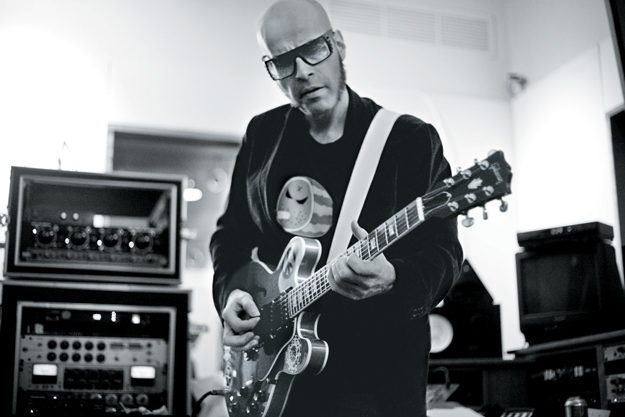Andrés Levin built his first multitrack recording device at the age of eight in his parents’ home in Caracas. It was an appropriate start for an artist who has gone on to weave musical skill and technological precociousness into a career that has made him one of the most striking experimental artists of his generation.
Now 45, Levin is not only known for pushing the artistic envelope with his band, Yerba Buena, but also for his efforts to use music for social change. With his Cuban-born wife, actress/singer Cucu Diamantes, Levin organized the inaugural TEDxHabana conference in November 2014—just before President Barack Obama announced renewed diplomatic relations with the island. The event was meant as a platform to share ideas about technology and entrepreneurship during a critical moment of transition in Cuba. Levin says TEDxHabana provides a unique forum for Cubans to inspire each other with “ideas worth spreading.”
Levin’s musical talent runs in the family. His father, Luis Levin, a well-known animal behaviorist and scientist, founded an electronic music ensemble called Música Automática. The youngster was not allowed in the studio where his father’s ensemble rehearsed, but the rule led him to think of the studio as a “laboratory,” a place to explore, discover and innovate. He applied the same approach to his musical education, earning a full scholarship to Berklee College of Music in Boston before leaving for New York at 19. There, he worked in the studio of R&B/soul legend Nile Rodgers, took courses at The Juilliard School and Brooklyn College in composition and electronic music, and built up his reputation by collaborating with Brazilian and avant-garde noise artists. Levin describes his own development as a “natural evolution” of musical cultures.
After Levin and Diamantes formed Yerba Buena in 2002, the band burst upon the regional music scene with its debut album, President Alien (2003)—a wordplay on Levin’s resident alien status. The music was influenced by a trip Levin took to Nigeria, where he explored the influence of African rhythms on Brazilian and Cuban music while producing a Fela Kuti tribute album called Red Hot + Riot (2002). The idea, Levin said, was to see “where the borders of Afro roots come together [and] where they fall apart.”
But for his next experimental move, Levin stepped in another direction, aiming to use music to widen social awareness as “the next obvious dimension of the entertainment business.” The Red Hot series raised awareness and money to fight hiv/aids, inspiring Levin to start a nonprofit organization in 2007 called Music Has No Enemies, which uses music to support social causes ranging from human rights to education advocacy. One of the nonprofit’s projects was the video “I’m Alive,” which Levin produced in Rio de Janeiro’s Tijuca Forest for the Rainforest Alliance in 2014. He raised money to build a studio in the rainforest, directed the video, and wrote and produced the song with an all-star cast of Brazilian musicians to send a message about protecting Brazil’s ecologically fragile natural heritage.
Levin is already planning the next phase of his artistic evolution. Besides working on a new album with Diamantes, he’s developing four movie scripts and a new round of TEDx discussions in Cuba later this year. Still tinkering in his musical laboratory, Levin continues to deconstruct old genres and infuse them with new influences, producing projects that break down barriers and bridge political and cultural divides.
View the “I’m Alive” video, produced by Andrés Levin for the Rainforest Alliance.





